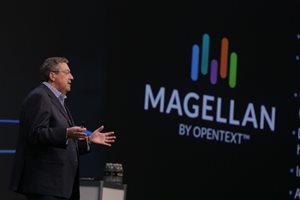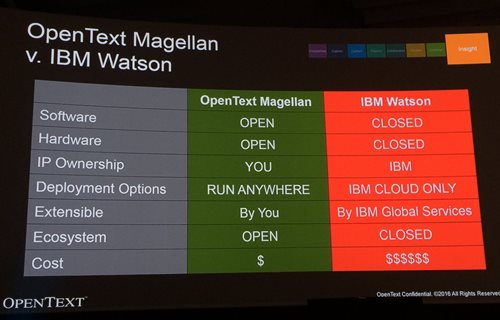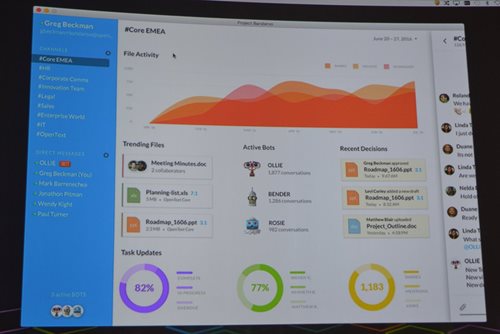OpenText Takes Aim at IBM
The home of country music Nashville, Tennessee, hosted the OpenText Enterprise World 2016 event this week. During the opening keynote, OpenText CTO and CEO Mark Barrenechea took aim at IBM’s cognitive learning engine, Watson, pointing out its closed ecosystem, limited deployment options, and high cost.
 Waterloo, Ontario-based enterprise information management company has been working on the form of an artificial intelligence-based engine called Magellan and described by Barrenechea as “one of the most exciting things that we’re working on.” Magellan is built on open standard x86 hardware in an effort of boosting the Spark Apache framework to offer an open framework and open algorithms, supporting a wide selection of engines such as voice recognition, facial recognition, natural language processing, and semantic analysis.
Waterloo, Ontario-based enterprise information management company has been working on the form of an artificial intelligence-based engine called Magellan and described by Barrenechea as “one of the most exciting things that we’re working on.” Magellan is built on open standard x86 hardware in an effort of boosting the Spark Apache framework to offer an open framework and open algorithms, supporting a wide selection of engines such as voice recognition, facial recognition, natural language processing, and semantic analysis.
“Our path on software is pure openness: open standards and open algorithms,” Barrenechea said. “Our ecosystem is open because of Spark Apache where by nature IBM’s ecosystem is closed. Our hardware is built open standard x86. You can choose your vendor, and you can choose your design. With IBM Watson, it’s closed. You use the Watson mainframe when you’re there.”
The part of keynote which OpenText CEO was criticizing IBM Watson was much more interesting than the product itself. In front of the crowd of 2,000 attendees and 300 partners, he expressed OpenText’s stance in a very straightforward way:
“We are going to position it directly against Watson. We’re not going to shy away from that at all,” Barrenechea said. “We think there’s a whole class of problems that enterprises want to solve themselves and what they need is an affordable platform, one that’s open and programmable to them and accessible to them and that’s going to be Magellan. So we’re going to position ourselves and stay focused directly against Watson.”
Besides the marketplace, he also commented on the IBM’s product’s IP ownership which is claimed to be one of the motivations for enterprises to invest in OpenText’s artificial intelligence-based technology instead of Watson. “It makes no sense to me,” Barrenechea said of IBM owning algorithms. "IBM owns the algorithm. Not with us. You write your algorithm, you own it." The flexibility of Magellan doesn’t stop there, users will be able to run OpenText Magellan “anywhere” such as on-premise, on the OpenText cloud or via a third-party host, while IBM Watson users can only run the solution in the cloud.
During the keynote, Mark Barrenechea also demonstrated a slide below comparing the two platforms, Magellan and Watson, so he let the cognitive wars begin:

Open source cognitive analytics platform Magellan is able to analyze both structured and unstructured information. According to Barrenechea, Magellan marks the “democratization of cognitive computing.” He also believes that it could compete IBM’s Watson in many market segments due to the cost as well.
“Watson is the sort of technology that you would want to use to try and solve one of the world’s major health problems, for instance. It’s not ideal for dealing with 90 percent of the issues that businesses want to address through analytics. I hear a lot of frustration, almost unequivocal frustration with Watson of its expense, its closed-ness and that it’s a sledgehammer when I’m trying to crack a walnut.”
The announcement of the cognitive analytics technology expansion has come on the heels of the report released by the consulting firm Deloitte which indicates the majority of European firms are struggling to marry their clouds to digital transformation. For this very reason, OpenText CEO Mark Barrenechea stressed:
Companies need cognitive solutions and embedded predictive analytics across a business network with more of their partners on that network. It’s ‘digital or die’ for firms as they are facing a changing workforce, a race to zero infrastructure, a landscape of shrinking trusted partners and next generation globalization.”
Another interesting fact is that OpenText has already tested out the concept for Magellan in the form of a US election analysis tool – Election Tracker US – to analyze media sentiment towards the Republican and Democrat nominee candidates: Trump and Clinton.
Project Bandaroo
During CEO and CTO Mark Barrenechea’s opening the keynote session, one of a couple of product announcements, made was Project Bandaroo described by the company as “the next generation of Enterprise Content Management and Social Software.” Project Bandaroo is built on the OpenText Core platform to create a collaborative environment which incorporates social communities, information and project channels, intelligent bots, and secure information management. It is designed to help organizations embrace digital transformation.

Another interesting point was that when a preview of the Project Bandaroo prototype was demonstrated, many noticed the similarities between the prototype and Slack. When asked, “Was that Slack?” during a post-keynote press conference, Barrenechea said simply, “No." He added that Slack "has similar concepts, there’s no doubt. So does HipChat and a couple others out there. It wasn’t Slack.”
Overall the company has announced a variety of enhancements such as embedded analytics, more Microsoft SharePoint services, EMEA data sovereignty to address privacy and data storage protection issues, more mobile-friendly, and integration with Hadoop data processing. On the data processing side, Barrenechea stressed the need for cognitive and machine learning solutions:
“It’s all about engagement, capture, and content, and we have extended our ecosystem in the enterprise content management (ECM) space, integrating closely with SAP, Oracle, and Microsoft, and now also closely supporting both Salesforce and SuccessFactors.”
All these show that OpenText has IBM in its sights and is getting ready to go toe-to-toe in a marketplace, although OpenText still needs to catch up with other big players. Nevertheless, the need for cognitive and machine learning solutions, which both IBM and Microsoft have been also tub-thumping about, seems to shape the future of the content management system industry.

Venus Tamturk
Venus is the Media Reporter for CMS-Connected, with one of her tasks to write thorough articles by creating the most up-to-date and engaging content using B2B digital marketing. She enjoys increasing brand equity and conversion through the strategic use of social media channels and integrated media marketing plans.